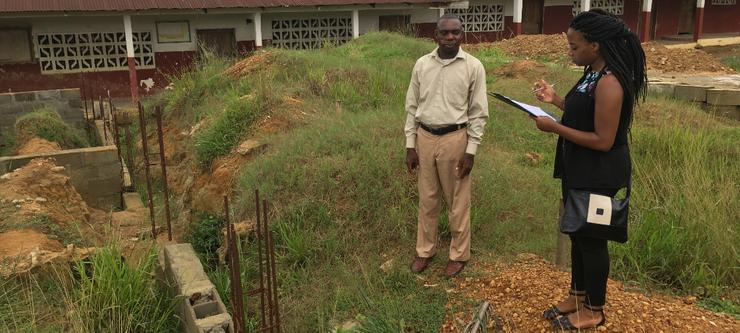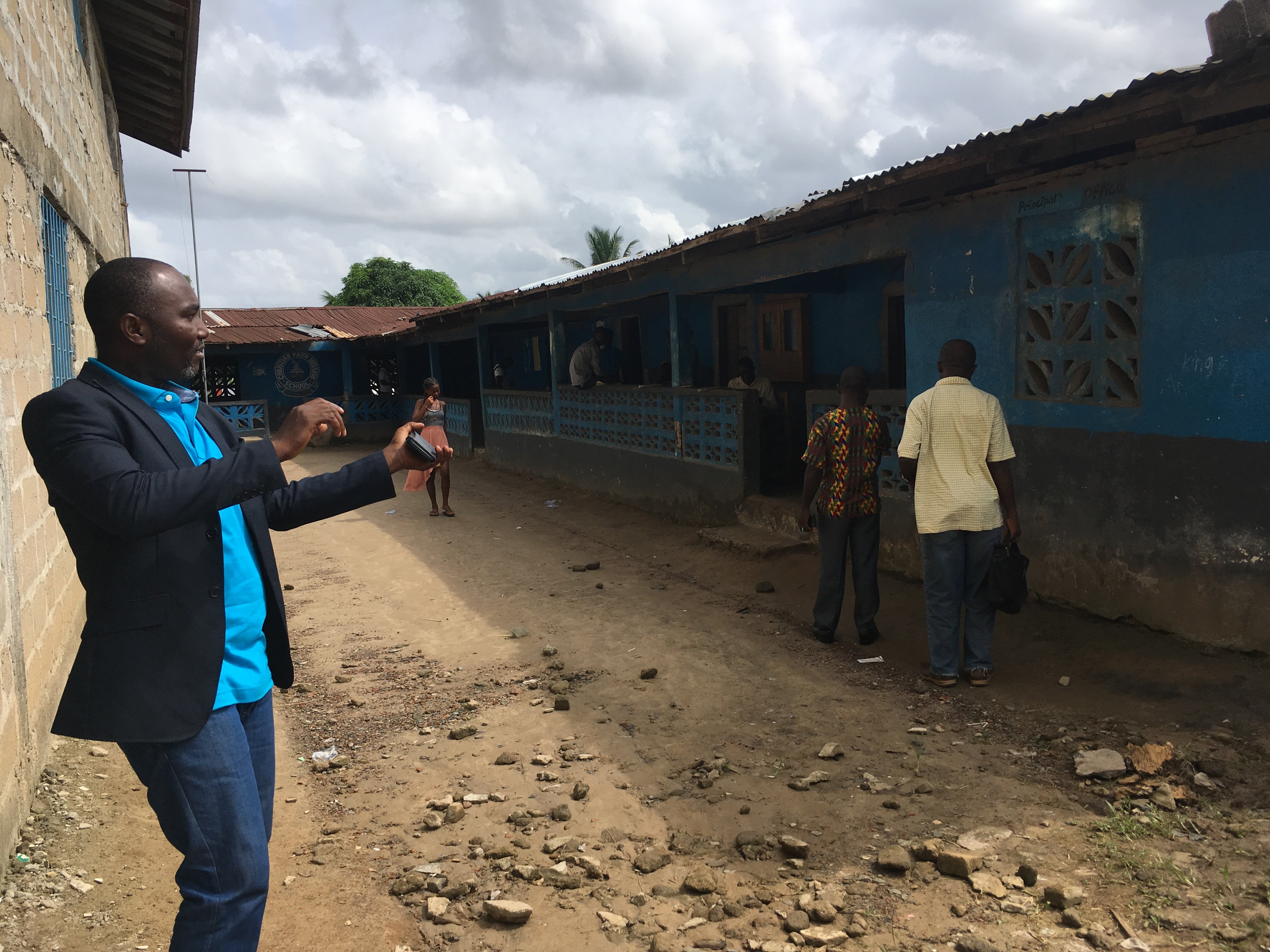Mentorship, Internship, Involvement: The Key Components of My Progress as a Peacebuilder

Mentorship, Internship, Involvement: The Key Components of My Progress as a Peacebuilder
The following post was written by Patricia Wakhusama, a 2018 graduate of the Kroc School’s Master of Arts in Peace and Justice program.
 One of the prospective school loan recipients that Patricia Wakhusma interviewed in Liberia
One of the prospective school loan recipients that Patricia Wakhusma interviewed in Liberia
begin quoteThe endless educational opportunities the Kroc School provided enabled me to clearly envision what I hoped African countries may strive to achieve: the creation of positive peace.
The Path That Led Me to the Kroc School
I joined the Kroc School not only with an intention to advance my education, but also to learn more ways to improve my community and my home country, Kenya.
I lived through the 2008 post-election violence in Kenya when I was just 14 years old. I witnessed firsthand how neighbors and friends easily turned on each other based on tribal affiliation. My family and I lived on the outskirts of Kenya’s capital city, Nairobi. Unfortunately, where we lived was one of the places where violence was taking place. As a result, my family was displaced, and eventually we had to move into Nairobi where it was safer. Little did I know at the time, this firsthand experience would propel me to pursue a Master’s in Peace and Justice (MAPJ) at the Kroc School eight years later.
Before joining the Kroc School, I graduated with a bachelor’s degree in criminal justice and spent time interning with the Administration Police Service under the disciplinary office. During my internship with the police, I had the opportunity to review cases of ex-police officers who had been dismissed from the service due to misconduct such as corruption, and later propose recommendations on whether they should be reinstated for duty or not.
While the recommendations proposed were never easy to make, it did expose me to — and require that I learn about — the environment that forced these police officers to become corrupt. When a police officer is paid only $200 a month and is expected to feed his family, take his children to school, and meet his basic needs, you begin to realize that the corruption isn’t driven purely by greed, but rather out of necessity. In other words, it’s a systemic problem.
As all these thoughts crossed my mind, I was even more excited to join the Kroc School’s peace and justice program, as I felt there would be boundless opportunities for me to learn and grow as a peacebuilder.
The Perspective and Skills I Gained From the Kroc School
During the MAPJ program, I grew to expand my thinking beyond peacebuilding. As peace and justice are greatly intertwined concepts, I learned how they could not exist without each other. I witnessed this in Kenya, where I saw victims of the post-election violence never fully gain justice due to shoddy investigations conducted by the International Criminal Court (ICC) prosecutors; I witnessed bribery, intimidation, as well as the failure of the Kenyan government to cooperate with the court. In the end, challenges arose related to whether to prioritize peace or pursue justice.
The peace vs. justice debate — should peace take precedence over justice, or vice versa? — seemed to be a recurring theme during my time at the Kroc School. It cropped up during my field-based practicum in Colombia, where a majority of the population voted against the peace agreement in 2016 due to concerns that accountability would be curtailed. The peace vs. justice debate also surfaced when I did my MAPJ internship in Liberia. From my interactions with the locals and work colleagues, it seemed like Liberians had prioritized pursuing peace over justice. After decades of civil war and a highly politicized peace process, there was fear of relapsing into conflict.
Throughout these experiences, I grew to better understand the negative impact posed when solutions proposed do not directly address or reflect the roots and drivers of a conflict. The endless educational opportunities the Kroc School provided enabled me to clearly envision what I hoped African countries may strive to achieve: the creation of positive peace.
These experiences also encouraged me to learn from other professionals doing peacebuilding work in African countries, and that’s why I was so grateful that the Kroc School had the Mentoring Alliance. The Mentoring Alliance program connects students with trusted and experienced professionals so that they gain perspective and guidance as well as access to valuable, real-world networking opportunities. Mentors introduce students to new contacts and resources so students can get started putting their knowledge and experiences into practice.
Through that program, I was connected to Deborah Lindholm, the founder of a nonprofit called Foundation for Women. As we developed our relationship throughout the semester, I gained the opportunity to intern with her nonprofit in Liberia for three months. At the time, she needed a program evaluation of a school loan program she was providing to low fee independent schools in Liberia. The education system in Liberia had been crippled during the civil war, and many schools could not afford to take loans. The program she provided gave the schools an opportunity to improve the school facilities. Fortunately, I was well equipped and prepared to conduct the evaluation, as I had just taken a class in program design, monitoring, and evaluation taught by Associate Professor Topher McDougal.
The internship lasted for three months. I conducted an impact evaluation by first coordinating all of the meetings with the principals and administration, and later by interviewing the school proprietors for my research. Through this evaluation, I was able to learn what impact the loans had on the schools.
Ultimately, I compiled a report of my findings and shared it with Deborah. About the report, she said, “Both Foundation for Women and our education partner Edify were very grateful for Patricia’s hard word and the collection of data regarding our school loan program. We are able to document our input now vs. simply saying we are making things better in education in this country (Liberia).” She added, “The biggest impact was on our organization and our partner Edify by validating what we hoped — Foundation for Women, with our partners, is truly changing the education in this country (Liberia).”
As the majority of my internship entailed research, I had the opportunity to speak with locals and colleagues at the office regarding their experience within the civil war and whether they felt that Liberia had fully progressed towards sustainable peace. The experience of the internship reminded me how, at times, it takes outside intervention to create change in our societies. The Liberian government may be taking steps to try and resolve the education system in Liberia; however, there is still a social responsibility that we have as peacebuilders to be invovled.

One of the prospective school loan recipients that Patricia Wakhusma interviewed in Liberia
Post-Graduation and the Next Stage of My Peacebuilding Career
Thanks to the Kroc School's Mentoring Alliance program, the internship it led to, and the many opportunities the Kroc School provided to connect with peacebuilding organizations, I had already built a network in San Diego by the time I graduated. I had been volunteering with nonprofits like Alliance for African Assitance for almost a year, and through this experience, I was recommended by some colleagues to another organization focused on refugee restlement called Nile Sisters Development Initiative, where I currently work as a Community Engagement Specialist. My role mainly entails engaging diverse communities and key stakeholders in tackling issues affecting refugees and immigrants, conducting outreach to and enrolling participants in social-adjustment support services, and providing culturally proficient services and case management.
At Nile Sisters, I am exposed to so many refugees in the City Heights neighborhood of San Diego, especially those of African descent. Throughout these interactions, I am constantly reminded how much work is needed at home in Kenya. As I work to gain experience in the United States, I am energized and challenged every day to find ways to create an impact back home.
I encourage prospective students who are passionate in this field to pursue the MAPJ program. As an African living in the United States for almost two and a half years, I know the present challenges that we experience as outsiders. We often get misunderstood, either culturally or through language. However, throughout my time at the Kroc School, it proved to be a safe haven where I could always be myself. Reflecting on my experience there, I realize that the interactions and connections I made with my cohort had a tremendous positive impact on my education. Learning with people who share similar values made it much more valuable and enjoyable throughout.
Contact:
Kevin Dobyns
kdobyns@sandiego.edu
(619) 260-7618

About the Author
The Joan B. Kroc School of Peace Studies (Kroc School) at the University of San Diego is the global hub for peacebuilding and social innovation. Founded in 2007, the Kroc School equips the next generation of innovative changemakers to shape more peaceful and just societies. We offer master's degrees in peace and justice, social innovation, humanitarian action, conflict management and resolution, and a dual degree in peace and law — programs that have attracted diverse and dynamic students from more than 50 countries. In addition to our graduate programs, the Kroc School is home to the Kroc Institute for Peace and Justice (Kroc IPJ). Founded in 2001, the Institute supports positive change beyond the classroom. Through groundbreaking research, experiential learning, and forward-thinking programs, the Kroc School and Kroc IPJ are shaping a future in which peaceful co-existence is the new normal.





